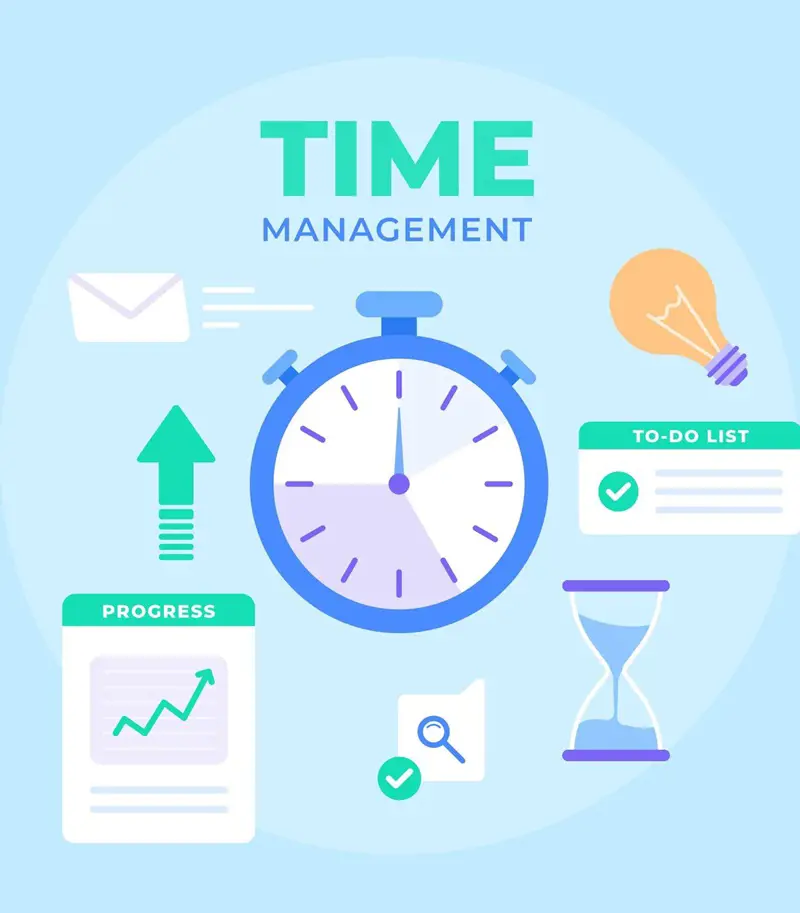
Time management refers to the process of organizing and allocating time to different tasks. The ultimate aim is to enhance and improve the overall quality of life.
Effective time management empowers individuals to identify their priorities, eliminate time-wasting activities, and focus on tasks that contribute to their overall well-being and success. By creating a structured schedule and adhering to it, individuals can reduce stress, increase efficiency, and create a sense of accomplishment.
Browse below to find out mind-blowing time management skills:
What Is Time Management?

Time management is the art of planning and controlling how you spend your time. It involves a set of skills and techniques that help you maximize your productivity and achieve your goals.
Here's a breakdown of its key components:
Planning:
- Setting goals and priorities: Defining what you want to achieve and what tasks are most important helps you allocate your time effectively.
- Creating schedules and to-do lists: Breaking down your goals into smaller, actionable steps and organizing your day helps you stay focused and avoid feeling overwhelmed.
- Time blocking: Dedicating specific time slots for specific tasks ensures you give each one the attention it deserves and reduces context switching.
Controlling:
- Minimizing distractions: Identifying and eliminating things that disrupt your focus, like social media, emails, or unnecessary meetings, allows you to work more efficiently.
- Delegating and outsourcing: Recognizing what tasks can be done by others frees up your time for the things you need to do yourself.
- Saying no: Learning to politely decline requests that don't align with your priorities or capacity prevents your schedule from getting overloaded.
- Tracking your time: Understanding where your time goes can help you identify areas for improvement and adjust your approach accordingly.
Benefits of Good Time Management
The benefits of good time management reach far beyond simply checking off tasks on a to-do list. It's about taking control of your most valuable resource: your time. Here's a deeper dive into how good time management can enrich your life:
- Increased productivity: You get more done in less time, allowing you to achieve your goals faster.
- Reduced stress: Feeling in control of your time and workload leads to less anxiety and overwhelm.
- Improved work-life balance: You have more time for the things that matter outside of work, like family, friends, and hobbies.
- Enhanced focus and clarity: You're able to concentrate better on tasks and make better decisions.
- Greater sense of accomplishment: Completing tasks and achieving goals boosts your confidence and motivation.
1. Set SMART Goals

Adding SMART goals to your time management toolkit is like equipping yourself with a laser-focused sword. It helps you slice through distractions and conquer your to-do list with precision.
- Specific (S): Be specific about what you want to achieve, when, and how.
- Measurable (M): Use numbers, percentages, or specific timeframes to track your progress.
- Achievable (A): Be realistic about your time and resources. Stretch your limits, but don't snap them.
- Relevant (R): Ask yourself "why?" before setting a goal. Does it contribute to your bigger picture?
- Time-bound (T): Set specific dates or times to achieve your goals. This creates a sense of urgency and keeps you accountable.
2. Prioritize Tasks

Prioritizing tasks is a fundamental aspect of effective time management. With the myriad of responsibilities that individuals face on a daily basis, it becomes crucial to distinguish between tasks based on their importance and urgency.
Regularly review your list and adjust priorities as needed. Prioritizing those tasks is the secret sauce to unlocking true time management mastery. Unexpected tasks will arise, so be flexible and adapt your schedule.
3. Create a To-Do List

The best tip for effective time management is creating a to-do list. A well-structured to-do list serves as a roadmap for your day, providing a clear outline of tasks that need to be accomplished.
Start by brainstorming all your tasks, big and small, from work and personal projects to errands and appointments. Regularly check your progress and review your list. Celebrate completed tasks and adjust your estimates or priorities as needed. This reflection helps you learn and improve your time management skills.
4. Use Time Blocks

Another good time management thing to do is use time blocks. This approach involves dividing your day into specific blocks of time, each dedicated to a particular task or type of activity.
By assigning distinct time slots to different responsibilities, you create a structured schedule that helps you maintain focus and manage your time more efficiently. Implementing time blocks allows you to prioritize tasks based on their importance and deadlines.
5. Embrace The Power of Automation

Embracing the power of automation is a game-changer in the realm of time management. In today's technologically advanced world, there are numerous tools and software solutions designed to automate repetitive and time-consuming tasks.
By leveraging automation, you can significantly increase your productivity and free up valuable time for more strategic and creative endeavors. For instance, email filtering and sorting tools can categorize and prioritize your messages.
6. Eliminate Distractions

Distractions are the productivity kryptonite, zapping our focus and leaving us with a to-do list that resembles a mythological beast. Practice mindfulness exercises like meditation or short breathing breaks to combat wandering thoughts.
Silence notifications, use website blockers, and consider designated deep work zones free from phones and laptops. Schedule specific times for checking email and social media, and avoid multitasking with these activities while working on focused tasks.
7. Batch Similar Tasks

Jumping between different tasks constantly zaps your focus and productivity. Batching similar tasks minimizes those switches, allowing you to enter a deep flow state for each category. This approach minimizes the mental switching cost associated with constantly shifting between different types of tasks.
Completing similar tasks in a row can create a sense of accomplishment and momentum, motivating you to tackle the next batch with vigor. The idea is to capitalize on the efficiency gained when your mind is already in a particular mode.
8. Use the Pomodoro Technique

This technique was developed by Francesco Cirillo in the late 1980s and has since gained widespread adoption for its effectiveness in enhancing productivity. Implementing the Pomodoro Technique involves breaking your work into intervals, and using a timer to mark the 25-minute focused sessions.
After completing four Pomodoros, take a longer break of around 15-30 minutes. The underlying principle is that the timer creates a sense of urgency, prompting individuals to stay on task during the focused intervals while the breaks prevent burnout and maintain overall productivity.
9. Set Deadlines

Set achievable deadlines that consider the complexity of the task, your own pace, and potential interruptions. Don't overload yourself with unrealistic expectations.
Break down large projects into smaller, manageable tasks with their own deadlines. This creates a sense of accomplishment and prevents feeling overwhelmed. This practice also facilitates better tracking of progress, enabling you to identify potential bottlenecks or areas that may require additional attention before the final deadline approaches.
10. Learn to Say No

Looking for tips for time management? Try learning to say no. It involves the ability to assess your current workload, priorities, and capacity realistically. Recognizing when you're reaching your capacity helps you avoid overcommitting.
Saying no doesn't imply a lack of willingness to help or collaborate; rather, it signifies a commitment to preserving your time and energy for tasks that align with your goals and priorities. By declining tasks or commitments that do not contribute significantly to your objectives, you create space for more meaningful and impactful work.
11. Limit Multitasking

One of the most useful tip for time management at work is limiting multitasking. Juggling multiple tasks might feel productive, but it often leads to decreased focus, increased errors, and ultimately, less productivity.
Train your brain to prioritize one task at a time. Deep work, where you dedicate your full attention to a single task, leads to better results and higher quality work. Focusing on one task at a time allows you to dedicate your full attention and cognitive resources, leading to better results and a more efficient workflow.
12. Use Productivity Tools

In the fast-paced digital age, leveraging productivity tools can significantly enhance time management skills. There is a plethora of applications and software designed to streamline tasks, manage schedules, and improve overall efficiency.
Project management tools like Trello, Asana, or Jira help organize and prioritize tasks, providing a visual representation of progress. Calendar applications such as Google Calendar or Microsoft Outlook aid in scheduling and tracking appointments, deadlines, and events.
13. Avoid Perfectionism

Perfectionism can lead to excessive time spent on a single task, causing delays in completing other important responsibilities. The pursuit of perfection often involves unnecessary attention to minor details, hindering overall progress.
Recognizing that not every task requires perfection and embracing the concept of good enough can significantly increase productivity. By setting realistic standards and acknowledging that perfection is rarely attainable, individuals can allocate their time more wisely without compromising quality.
14. Set Boundaries

Set boundaries to protect your precious hours from internal and external encroachments. Establishing clear limits on your availability helps prevent burnout and ensures that your time is allocated efficiently.
Be honest about your energy levels and capacity. Schedule demanding tasks for peak productivity hours and lighter tasks for times when you need to recharge. This not only prevents overcommitment but also enhances your ability to deliver high-quality work on time.
15. Time Tracking

Tracking your time involves recording and analyzing how you spend your hours throughout the day. By understanding where your time goes, you can identify patterns, inefficiencies, and areas for improvement.
One of the key benefits of time tracking is increased awareness. When you meticulously record your activities, you gain a clear understanding of how much time is allocated to specific tasks. This awareness allows you to spot time-wasting activities and procrastination tendencies.







